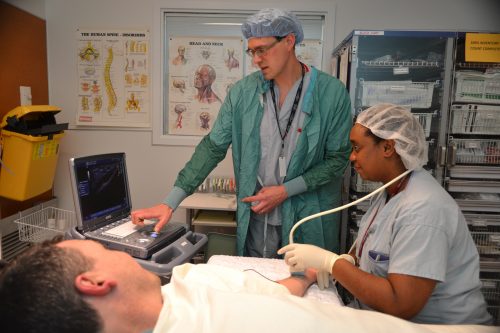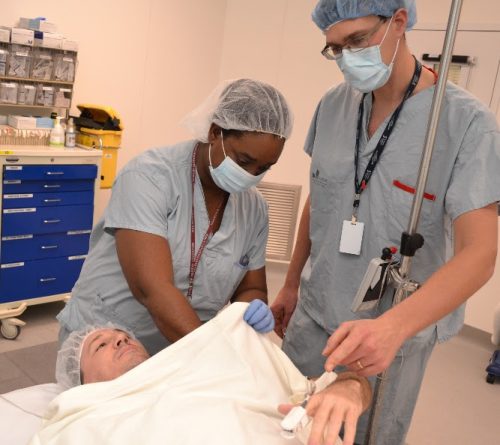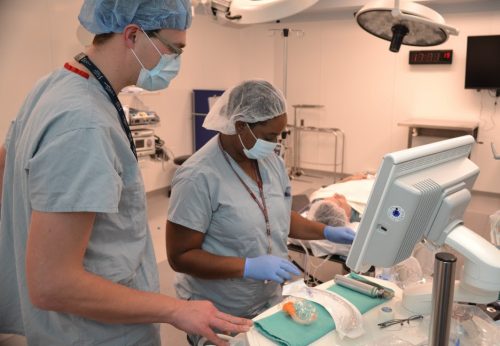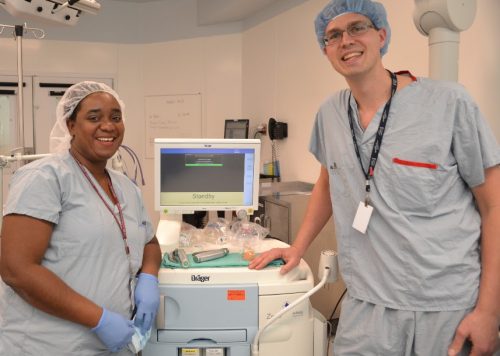Dr. Youlanda Hendricks came to Hamilton recently from Guyana for a 16-week elective during her anesthesia residency. We sat down with Dr. Hendricks (left) and her clinical supervisor, Dr. Joel Hamstra (right) of St. Joseph’s Healthcare Hamilton, for a chat.
Alan Sharpe: Youlanda, what have you learned while you have been here?
Dr. Youlanda Hendricks: Canada’s very cold. [Laughter]
Alan Sharpe: [Laughter] Poutine is great. Have you tried Poutine yet?
Dr. Youlanda Hendricks: I don’t like Poutine. [Laughter]
Alan Sharpe: Oh, so you’ve tried it! [Laughter]
Dr. Youlanda Hendricks: Yes, I’ve tried it. Coming off of the plane in January was sort of different. The culture shock was a bit . . . the difference in cultures was evident.
Alan Sharpe: In what way?
Dr. Youlanda Hendricks: Have you ever been to Guyana?
Alan Sharpe: I imagine our pace is a little faster.
Dr. Youlanda Hendricks: Yeah, people move a lot more quickly. To some people, we appear to be more laid back, although we’re probably not. Then there’s been the adjustment to the weather, the food, being away from home. It’s more or less being alone in Hamilton. I have no relatives in Canada.
Alan Sharpe: So what have you learned while you’ve been here that you’re going to take back to Guyana?

Dr. Youlanda Hendricks: Clinically, it’s been a lot. I’ve been exposed to thoracic surgery, there are techniques and technical skills that are unique to every specialty and I think I’ve been fortunate enough to learn most of those. And I’ve also been exposed to a lot of drugs that we don’t have back home, and I’ve been exposed to a lot of drugs that we do have back home. So I’m taking back now with me, how to use what we don’t have, and to better use what we do have.
Alan Sharpe: Are you specializing in any area while you’re here?
Dr. Youlanda Hendricks: I’m here to rotate in four specialties: thoracic surgery, vascular surgery, neurosurgery, and cardiovascular surgery. And also to see how the labour epidural services run. I have a special passion towards obstetrics anesthesia.
Alan Sharpe: How would you describe your experience here? If you had to sum it up in a couple of words, a few sentences: Clinically, academically?
Dr. Youlanda Hendricks: It’s been great. It’s been eye-opening to see things done a bit differently. I guess it’s anesthesiology in any setting, so you see that there are probably a million ways to skin a cat. It’s trying to choose a technique that works best for me and works best for me in my clinical setting. So it’s been good, it’s been a great experience.
Alan Sharpe: What’s your experience been like at McMaster? The International Outreach Program has a partnership with McMaster University to make sure that residents and clinical fellows have a good experience here. What’s your experience been like?
Dr. Youlanda Hendricks: It’s once a week, sometimes twice a week, depending on how lectures are scheduled. The academic sessions have been good. Everybody here has been nice and I can understand it’s a lot of work. It’s a lot of reading, and it’s a lot of studying, and it’s a lot of synthesizing.

Alan Sharpe: Dr. Hamstra, what’s it been like for you as Youlanda’s clinical supervisor?
Dr. Joel Hamstra: I think it’s been eye-opening as well for me. I’ve been on staff at St. Joe’s since 2008 and on faculty at McMaster since then, so I’ve had lots of experience teaching residents and medical students. This is the first time I’ve ever been involved in supervising a resident coming from another country to practice. I became involved in the Guyana program about a year ago when I visited Guyana with Dr. Alez Dauphin.
And while we were in Guyana, we met with the anesthesia residency program director (Dr. Alexandra Harvey) and talked about how to actually make this happen, to bring residents in anesthesia from Guyana to Hamilton. It’s been eye-opening for me. It’s been exciting, and it’s been a lot of work. And things that I don’t really think about, I’ve had to think about on the fly, but it’s been great.
Alan Sharpe: Can you give me an example?
Dr. Joel Hamstra: It’s exciting for me because when you practice in a certain area or in a certain style for a while, you really get inside a comfort zone. Unless you’re challenged to think about doing things differently, or how things happen elsewhere, or how a certain case might be done with different resources than we have, you’re not forced to do that.
So asking Youlanda, “How would you do this? What kind of things are you thinking about for this case? What would you do back home for this?” has been a great learning experience for me. Once when Youlanda and I were working together, we were looking at some lab results. Youlanda made the point that if she wanted this particular lab result in Georgetown, (the capital city of Guyana) she’d wait two days for it. I can get that lab result in about an hour here in Hamilton.
But if you don’t have that available, you have to shift the way that you practice medicine. I think when you’re able to shift that way of practicing medicine, when you are able to adapt to your resources, you become a better physician.

Alan Sharpe: I see. If somebody asked you why they should give a donation to the International Outreach Program to bring a doctor to Hamilton from Guyana, what would you answer?
Dr. Joel Hamstra: I think the main reason to support the International Outreach Program financially is easy to see by way of contrast. Say you donated five thousand dollars, and you were able to buy a specialized piece of equipment that you sent to an area that didn’t have that piece of equipment. That would be great, but once that piece of equipment was gone or became obsoletein five years, that five thousand dollar investment would be gone.
But if you invest that same five thousand dollars in a person’s education, you have a profoundly greater impact. You impact that person, you impact the people that that person will then interact with, and I don’t even mean the patients. I mean the medical students, the other residents. When Youlanda finishes her training and she becomes a staff anesthesiologist back in Guyana, she’s going to be working with residents, so it’s an investment that grows exponentially and touches so many people’s lives, and ultimately will impact patient care, for decades.
Alan Sharpe: What about you Youlanda? Why should someone make a donation to bring over one of your Guyanese colleagues?
Dr. Youlanda Hendricks: It means that our system back home becomes stronger because we will have more people who are trained, more people who have the expertise in specialty areas, to be able to handle a burden in our society.
Alan Sharpe: Thank you. That’s it, I’m done. No more questions.
Dr. Youlanda Hendricks: [Smiling] All those questions! That was an oral exam!
Dr. Joel Hamstra: [Laughter] No way. The oral exam is way worse.

